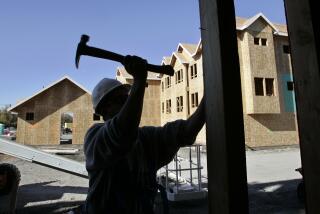Even Best of Intentions Can Be Tripped Up by False Assumptions
- Share via
We live in a community of well-meaning, generous people who want to do the right thing. But somewhere between our great ideas and our plans to implement them, we often miss something quite important.
This is the question: Is what we propose to do really the right thing or just what we assume is needed?
This question came to me while attending a recent meeting of community leaders brought together by the Ventura County Community Foundation to talk about regional planning. There were bankers, spiritual leaders, environmentalists, developers, representatives of nonprofit organizations and private philanthropists--but no elected officials. All of us were there because we were willing to give our time to discuss the quality of life and well-being of the people who live in our county.
We were asked to identify and prioritize issues to be addressed. Everyone agreed that among the most urgent was affordable housing. So we set out to develop a plan based on input from the people in the room.
It occurred to me that we could talk all day long about affordable housing and make assumptions about what would work, but what did we know about it? Most of us have never had to worry about having a roof over our heads or food on our tables. Most of us have enough money to buy our children clothes and tend to their medical needs.
What did we know about the needs of the people we were trying to help unless we asked them?
Last November, 47 families were displaced by a fire at Shadow Hills apartments in Thousand Oaks, operated by Many Mansions, a nonprofit affordable housing organization. These families, mostly Latino, were temporarily moved to motel rooms with no cooking facilities. Our community rallied to provide clothing and food until they could move back into their apartments.
I wanted to help bring meals to the families so I approached my fellow Rotarians at the Thousand Oaks Rotary Club and asked for their assistance. We decided to provide meals every Wednesday night until the families were able to return home.
I made a list of all the food items I would need for a chicken dinner night one week, an Italian food night, a turkey dinner and so on. I encouraged everyone to sign up to bring an entree, a salad, dessert or drinks. So many of the members donated cash that soon we could provide professionally prepared meals. All I had to do was plan the menu and deliver the food.
Each week the displaced residents graciously accepted our meals of lasagna, chicken and deli items and thanked me. But it wasn’t until I had run out of ideas and decided to go to the Latino Market that I realized I had been making a mistake. I had been providing what I assumed they would want to eat when in fact what they would have preferred was something very different.
I asked the owner of the Latino Market what he thought the families would like, and he said carnitas. I had no idea what this was, so I gave him my budget and left it up to him.
When my daughter and I showed up that evening to pick up the food, the market workers gave me a pan of rice, a pan of beans and a big pan of bones with meat on them. It was roasted pork, but I didn’t know what to do with it.
I was confused but I couldn’t communicate because the employees on duty didn’t speak English and I don’t speak Spanish. I approached another customer who spoke both languages, and I explained that I was supposed to have picked up carnitas but I didn’t know how to serve what they had given me. I asked him to look at the food and tell me what to do.
He said something to the store employees in Spanish and soon they were chopping up cilantro and onions and taking the meat off the bones.
When we delivered this meal to the families, the response was unbelievable. They had always shown gratitude for everything before but this night each person must have thanked us two or three times. I thought, “Wow, this is what I should have been doing all along.”
When we want to help people, we need to go to them and ask what they need. We can’t assume that what we like is what they like--or even that what we want them to have is what they need.
It is the same with affordable housing. We are well-meaning people making assumptions about what people need, but we never ask them what they need or what works for them. In assuming that we are doing the right thing, we could very well being going down the wrong path.
I have spent many years helping people--at least I thought I was helping them. I now realize that I could have done so much more if I had stopped and asked them what they needed instead of assuming that I knew.
More to Read
Sign up for Essential California
The most important California stories and recommendations in your inbox every morning.
You may occasionally receive promotional content from the Los Angeles Times.






